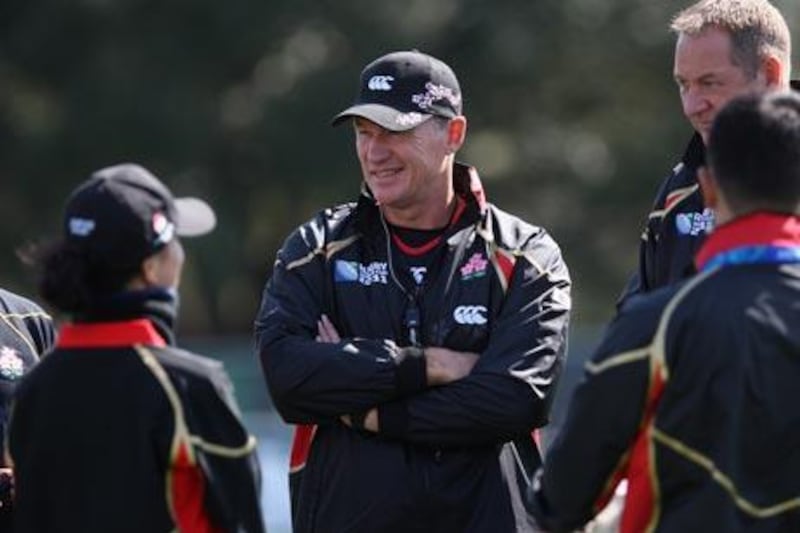New Zealand and Japan maybe poles apart in terms of playing resources, rugby history and their expectations for the 2011 Rugby World Cup but the nations were united by their grief and devastation earlier this year after being hit by earthquakes.
Rugby World Cup
Eagles aim to rock Rugby World Cup boat
With just two wins in the six previous tournaments, Mike Petri, the United States scrum-half, says the team are counting on rival sides underestimating them.
Fast, physical and aggressive: rugby is a game much to Russia's liking. Read article
Diamonds in the mud at the Rugby World Cup. Read article
Challenges facing the crisis-torn Rugby World Cup hosts. Read article
[ MORE ON THE RUGBY WORLD CUP ]
An earthquake and tsunami in Japan on March 11 left 20,000 dead or missing and triggered a nuclear crisis, less than a month after an earthquake killed 181 people in Christchurch, New Zealand's second largest city.
The natural disasters were particularly poignant for John Kirwan, a New Zealander and a former All Black, who coaches Japan.
Kirwan said last week that he wants his Japan team, also known as the Cherry Blossoms, to play with a commitment to those people still suffering hardship from the disasters.
"We play for the people who we love and especially at the moment with New Zealand and Japan with the earthquakes, it's very important that we take those people with us," Kirwan said. "It's a very important time for us to go on to the field and show that emotion."
Kirwan, however, said he did not want to use the disasters to spur on his players.
"One of the things that I don't need to do is use the tragedy as a motivation because I'm not prepared to do that because for me that is bad taste," he said.
"I will leave each player to deal with how they want to use it. I want to send the message of courage and commitment back to the people. The scoreboard is not important, but our attitude is right through the tournament."
Kirwan has the utmost respect for what the people in Japan and Christchurch have gone through since the disasters.
"The greatest thing the people of New Zealand and Japan have shown is courage through adversity," he said. "I think that is a very important message, not only for our rugby team, but for everyone.
"That having respect for the person next to you and showing courage through hard times is certainly how I want to live and certainly how the team want to play."
Having left behind the 30°C heat at home, Japan had a rude awakening to the wet and windy conditions and 10°C temperatures that teams will face at the World Cup.
"I had a little bit of an issue with a couple of the little half-backs that got a little bit cold and ran inside, so I had to ask them if they want to be selected if it's raining and cold," Kirwan said. "We had a bit of a laugh about it."
New Zealand was hit by snow storms last month, and Hiroki Yuhara, the Japan hooker, was one of those complaining about conditions. "It was so cold out on the field. The rain came down so hard it hurt. I couldn't see because the rain covered my eyes," Yuhara said.
However, Toshizumi Kitagawa, the lock, was happy to be away from the heat. "Me personally, I like it cold more than hot. I feel better in this sort of weather," he said.
Japan kick off their campaign against France on Saturday before matches against New Zealand, Tonga and Canada in Pool A.
Takashi Kikutani, the captain, was not surprised by the conditions and said the team would not change tactics because of the weather as they try to finish third in the group and qualify for the next World Cup in England in four years time.
"There's New Zealand for you. I'll just try to enjoy the weather along with the rugby and have a good time," the flanker said.
"Our strength is pace so we want to play a fast game versus the French.
"We're not going to try anything new at this phase. We can only do what we've been doing all along ... but at a higher level."
Japan, though, need to show signs of steady progress at this year's event as they will become the first Asian nation to host rugby's showcase event in 2019.
The theory about Japan's lack of success over the years is that they have been too small to compete at rugby's most elite level, but Kirwan refuses to buy into that.
"I think that has been an excuse up until now," said Kirwan. "We have the fastest speed over 15 yards. We need to play a fast, agile type of game and really concentrate on our skills and ability."
One of Kirwan's biggest challenges has been finding the right blend between local talent and foreign imports.
"What I've said is we need the foreigners to be competitive [now], but if we still need them in 10 years then we haven't done our job," Kirwan said.





